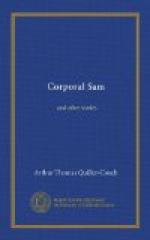Doctor Unonius sighed. He had designed to spend the evening on his treatise. But he cherished a real regard for Sir John, whom all the countryside esteemed for a sportsman and an upright English gentleman; and Sir John, who, without learning of his own, held learning in exaggerated respect, cherished an equal regard for the doctor.
‘My compliments to your master. I will come with pleasure,’ said Doctor Unonius, thrusting Homer back in his shelf.
CHAPTER III.
‘Wunnerful brandy, Sir John!’ said old Squire Morshead.
He said this regularly as he dined at Penalune when, after dinner and wine and songs, the hour came for the ‘brandy-mixing’ before the guests dispersed. Sir John was a widower and confined his hospitality to men. He had adored his wife and lost her young; and thereafter, though exquisitely courteous to ladies when he met them— on the hunting-field, for example—he could not endure one within the walls of Penalune. As he put it to himself, quoting an old by-word, ‘What the eye don’t see the heart don’t grieve.’ It scarcely needs to be added that the heart did grieve; but this was his way, albeit a strange one, of worshipping what he had lost.
For the rest, he was a hale, cheerful, even jovial gentleman, now well past fifty; clear of eye, sound of wind and limb, standing six feet two in his stockings; fearing no man, on good terms with all, but liking his neighbours best, and no more eccentric than a country squire has the right, if not even the obligation to be. Unless it were in the saddle, you could scarcely see him to better advantage than at this ceremony of brandy-mixing—for a ceremony it was; no pushing of a decanter, but a slow solemn ladling by the host himself from an ample bowl. Moreover, the Penalune brandy was famous.
‘It has lain,’ said he—’let me see—thirty-five years in cellar, to my own knowledge. My father never told me how or when he came by it. Smuggled, you may be sure.’
The talk ran on smuggling and its decline. A Mr St Aubyn, of Clowance, lamented this decline as symptomatic—’the national fibre’s deteriorating, mark my words.’ A Mr Trelawny was disposed to agree with him. ‘And, after all,’ he said, ’the game was a venial one; a kind of sport. Hang it, a Briton must be allowed his sporting instincts!’ ’By the same argument, no doubt, you would justify poaching?’ put in Sir John, with a twinkle. Mr Trelawny would by no means allow this. ’It would interest me, sir, to hear you define the moral difference between smuggling and poaching,’ said Doctor Unonius. ‘I don’t go in for definitions, sir,’ Mr Trelawny answered. ’I’m a practical man and judge things by their results. Look at your Polpeor folk—smugglers all, or the sons of smugglers—a fine upstanding, independent lot as you would wish to see; whereas your poacher nine times out of ten is a sneak, and looks




